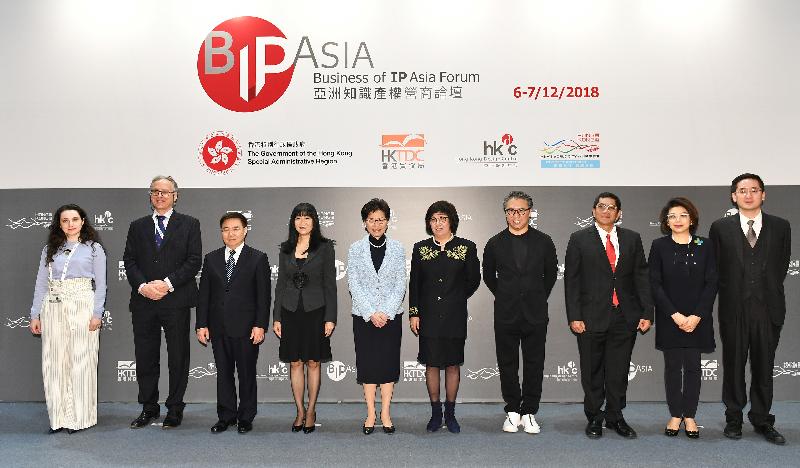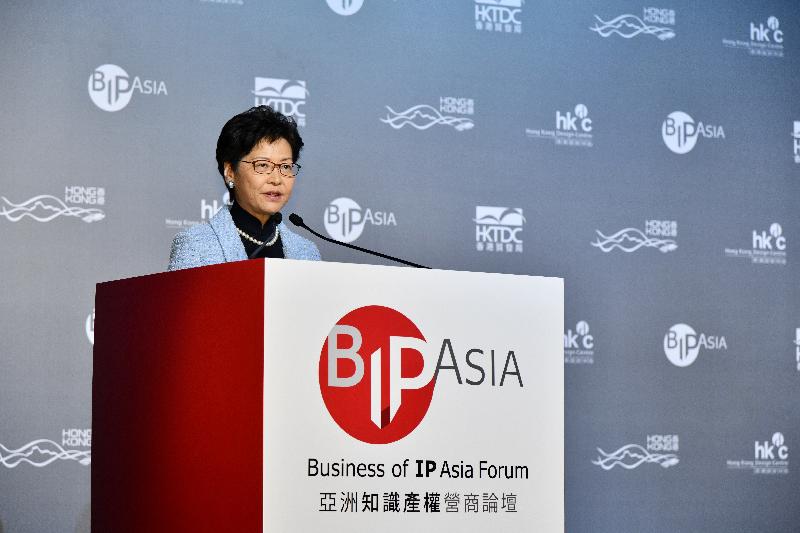Speech by CE at Business of IP Asia Forum (English only) (with photos/video)
Following is the speech by the Chief Executive, Mrs Carrie Lam, at the Business of IP Asia Forum this morning (December 6):
Deputy Director-General Wang Binying (Deputy Director-General of the World Intellectual Property Organization), Deputy Commissioner He Zhimin (Deputy Commissioner of the National Intellectual Property Administration), Margaret (Executive Director of the Hong Kong Trade Development Council, Ms Margaret Fong), Eric (Chairman of the Hong Kong Design Centre, Professor Eric Yim), distinguished guests, ladies and gentlemen,
Good morning. I'm pleased to be here at the 2018 Business of Intellectual Property Asia Forum, and to do so once again in my capacity as Chief Executive of the Hong Kong Special Administrative Region (SAR). Allow me to first welcome the 2 500 attendees of this two-day Forum, who are coming from Hong Kong, Mainland China and all over the world.
"Intellectual property" (IP) is a compound expression. While the "property" may be "intellectual", the point of the term, and actually the point of this Forum, is firmly fixed on business. You're here to gather the latest IP intelligence and information, to network, to connect with the IP world, and to excel together in the expanding business of intellectual property. Your wide-ranging interests underline the huge business opportunities enabled by IP, and your presence speaks of the relevance of IP to so many aspects of our daily lives.
Innovation is the key to unlocking the boundless value and the bountiful benefits of IP. That reality lies at the heart of my Government's high-priority agenda for innovation.
In June, I had the pleasure of meeting the Hong Kong award winners from the annual International Exhibition of Inventions of Geneva, the most important gathering of its kind in the world. I took pride in the remarkable achievements made by our home-grown inventors. At the April Exhibition, Hong Kong showcased nearly 100 inventions, from microbial technology that turns food waste into biodegradable plastic bags to lip-based passwords for access control.
Hong Kong Polytechnic University also took part, presenting its invention of a spectacle lens designed to slow the progression of myopia, or short-sightedness, in children. That innovation, I'm proud to say, was awarded the Grand Prize – the event's top honour, besting 800 entries from all over the world.
Since then, the spectacle lens has gained a patent for its Defocus Incorporated Multiple Segments, or DIMS, technology from the Mainland, while filing patent applications in Hong Kong, Macao and the United States. Even better, it's been on sale in Hong Kong and the Mainland since July this year. A global launch is slated to begin in the coming year.
Then there's the partnership between our Airport Authority and a local technology start-up called D2V Limited. They have jointly developed the world's first automated system for conducting integrity checking of airfield ground lighting. The new system, I'm told, can reduce physical inspection time by up to 83 per cent. That would enable our airport, which is already one of the world's busiest and handling more than 1 100 flights every day, to accommodate a good many more flights. The system won the 2017 International Airport Review inaugural Airside Operations Award. The Airport Authority will promote the system and explore licensing opportunities with other airports.
These two home-grown examples are fine illustrations of the theme of this year's Forum: "IP and Innovation in the New Socio-technological Landscape". In the highly competitive global marketplace nowadays, innovation requires much more than having some great ideas. True innovation occurs when inventors can harness the power of IP and commercial insights, and successfully transform new inventions into products and services which can benefit the users in need.
The essential pairing of IP and innovation is driving business growth and improving quality of life all over the world. That certainly includes Mainland China, a rising IP powerhouse. According to the statistics released by the World Intellectual Property Organization, China is the driving force for the growth in patent filings, as well as trademark and industrial design applications. In 2016, the amount of patent filings worldwide reached 3.1 million, up 8.3 per cent over the previous year, and the Mainland accounted for 98 per cent of that growth.
IP creation and its trading are growing rapidly in the Guangdong-Hong Kong-Macao Greater Bay Area. In 2017, the number of patent applications from the Greater Bay Area outnumbered the total of the world's three other renowned bay areas, namely Tokyo, New York and San Francisco. The Bay Area's growth potential, in short, is enormous.
The Belt and Road Initiative also offers unprecedented opportunity for many businesses, IP trading very much included. The crucial role played by IP to the Initiative was highlighted by President Xi Jinping in his message to an IP conference for Belt and Road countries held in Beijing this August, in which the President pointed out that the effective use and protection of IP rights is vital to the Belt and Road Initiative.
Those two far-reaching national strategies of Mainland China – the Belt and Road Initiative and the Greater Bay Area development – will give rise to immense opportunities for Hong Kong. They certainly include serving as an IP trading hub for the Asia-Pacific region. To realise that promise, my Government will double funding for three schemes under our Innovation and Technology Fund, both to fully unleash our scientific research capabilities and to realise their research and development findings.
We will, as well, continue to augment our IP regime, taking rigorous action to protect the legitimate rights and interests of IP rights' holders. I should add that we're doing a pretty good job of that now. In the latest Global Competitiveness Report released in October by the World Economic Forum, Hong Kong ranked ninth out of 140 economies in IP protection.
To encourage IP trading, we amended our tax law in June. It expands profits-tax deductions for capital expenditure incurred for the purchase of IP rights from five to eight types. That means the deduction regime covers rights in the layout design of integrated circuits, plant variety and performance. We also plan to establish an original grant patent system in the coming year. I'm confident that it will complement our efforts to develop Hong Kong into a regional IP and I&T hub.
And, of course, this Forum itself is testimony to our commitment to promoting IP trading. Over the next two days, more than 80 high-profile IP professionals from around the world will address the audience on the boundless promise and notable challenges that IP presents for you and your business. They include, I'm pleased to say, senior officials from the National IP Administration of China, the World Intellectual Property Organization, the World Trade Organization and the Israel Patent Office. I am grateful for their support. My thanks, as well, to the Hong Kong Trade Development Council and the Hong Kong Design Centre for organising this annual two-day event with the Hong Kong SAR Government.
Ladies and gentlemen, IP has a central role in shaping our global, knowledge-based economy. As Lord Thomas Dewar so eloquently distilled it, and I quote, "Minds are like parachutes – they only function when open." We need, in short, to embrace innovation with a willing, wide-open mind, if we are to capitalise on what IP and innovation can realise. Together, they can help us all connect and excel.
I wish you a memorable Forum and a rewarding year ahead in your IP pursuits. Thank you very much.

